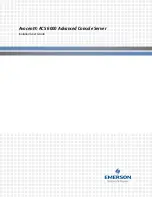
Introduction
.....
3
Flexible users and groups
An account can be defined for each user on the console server or on an authentication server. The
admin and root users have accounts by default, and either can add and configure other user
accounts. Access to ports can be optionally restricted based on authorizations an administrator can
assign to custom user groups. For more information, see
Users Accounts and User Groups
on
page 53.
Security
Security profiles determine which network services are enabled on the console server.
Administrators can either allow all users to access enabled ports or allow the configuration of group
authorizations to restrict access. You can also select a security profile, which defines which
services (FTP, ICMP, IPSec and Telnet) are enabled and SSH and HTTP/HTTPS access. The
administrator can select either a preconfigured security profile or create a custom profile. For more
information, see
Security
on page 22.
Authentication
Authentication can be performed locally, with One Time Passwords (OTP), a remote Kerberos,
LDAP, NIS, RADIUS, authentication server or a DSView server. The console server
also supports remote group authorizations for the LDAP, RADIUS and authentication
methods. Fallback mechanisms are also available.
Any authentication method configured for the console server or the ports is used for authentication
of any user who attempts to log in through Telnet, SSH or the web manager. For more information,
see
Authentication
on page 49.
VPN based on IPSec with NAT traversal
If IPSec is enabled in the selected security profile, an administrator can use the VPN feature to
enable secure connections. IPSec encryption with optional NAT traversal (which is configured by
default) creates a secure tunnel for dedicated communications between the console server and
other computers that have IPSec installed. ESP and AH authentication protocols, RSA Public Keys
and Shared Secret are supported. For more information, see
IPSec(VPN)
on page 33.
Packet filtering
An administrator can configure a console server to filter packets like a firewall. Packet filtering is
controlled by
chains, which are named profiles with user-defined rules. The console server filter
table contains a number of built-in chains that can be modified but not deleted. An administrator
can also create and configure new chains.
Содержание Avocent ACS 6000
Страница 1: ...Avocent ACS 6000 Advanced Console Server Installer User Guide ...
Страница 6: ......
Страница 12: ...Introduction 6 ...
Страница 22: ...Installation 16 ...










































